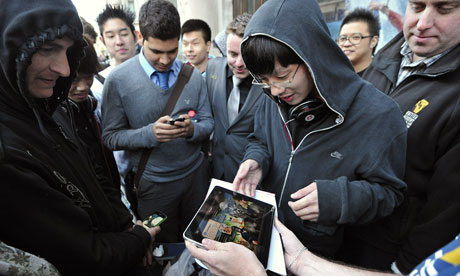
It was, in its way, the most impressive mass demo of the lot. Long queues shuffling peacefully along Oxford Street – and simultaneously buzzing down high streets around Britain. Hail to the Apple iPad 2, selling over a million on its first weekend. Many more thousands lining up overnight outside hundreds of shops from Worcester to Wolverhampton. Hail to the Nintendo 3DS, with Street Fighter 4 and Nintendogs + Cats leading the games rush. Surely some dislocation here?
This, remember, is writhing, cuts-enfeebled, angry Britain: a Britain close to anarchic despair. Let's put on our hoods and designer trainers and turn over Topshop again! But there is also another Britain that seems to exist in a parallel universe. The iPad 2 costs between £399 and £659, according to the number of bells and whistles you need (and apparently 25% of those buying it also shelled out for the iPad 1 only a few months ago). The Nintendo 3DS comes at a recommended retail price of £229.99 (minus street fighting or doggy entertainments).
But such basic numbers still put the tiny sums gained by a few thanks to George Osborne's Budget 2 in the shade. A couple with a non-working spouse and child netting £30,000 a year, slap in the famous squeezed middle, are just £138 better off: barely enough to get a one dimension kit. How many pennies saved on a litre buy you Face Raiders, let alone the full 3D?
So who were these tens of thousands rushing to back coalition George by kickstarting his boomlet? They couldn't all be bankers and Premier League stars. Some of them looked suspiciously like students who'd wandered in from a different demonstration. Some – especially on Nintendo street – were ordinary dads and mums squeezing out a few hundred pounds to make sure their kids had something to boast about at primary school in the morning. Have you seen my new one? It's amazing!
And there lies a difficulty that can't quite be glossed over. One trait of last week's budget coverage – a trait swollen by the generally shrivelled amount of actual news on offer – was the dear old vox pop. TV loves it; Fleet Street editors with pages to fill find it cheap and cheering. Thus Times readers, for instance, know what Laura from Darlington (34) thought when the chancellor sat down; how Sarah (57) from Norfolk and Sion (19) from Bangor viewed their financial future; whether Harry (23) from Leeds would sink or swim. Cue apprehension, encircling gloom. But none of the dozens interviewed said what they'd be doing on Friday morning. Nobody said they'd be buying an iPad – which is where dislocation bites.
Take the ancient, clapped-out DS, the so-yesterday one. It has sold a global 145m over the years – against just 90m iPhones. And the 3DS is set to do even better. It's what all kids "must have", the research says. So it's what all parents have to buy – along with a smartphone, a Wii, and an iPad 2 (before iPad 3 knocks it off the list). And this – just test it yourself at the school gate – isn't some entirely voluntary option. It is, as one struggling father confesses, a test of "our love". It's mandatory.
How does all this gadgetry, this never slackening demand for 1, 2 and 3, fit into the battered Britain of legend and protest? A sharp tabloid view would be to say that it doesn't. Go out and find me a disabled, unemployed victim of Iain Duncan Smith buying his iPad on the dole, snarls the newsdesk. But the truth, as ever, is more nuanced. It's about status, children, love and the misty bits in between. It's about two worlds seldom touching, about changing definitions of necessity. But it does work two ways (for marching doctors, journalists, top cops and union bosses, among others). It blurs the edges of hurt and desperation, the edges where rhetoric and reality don't quite meet.

